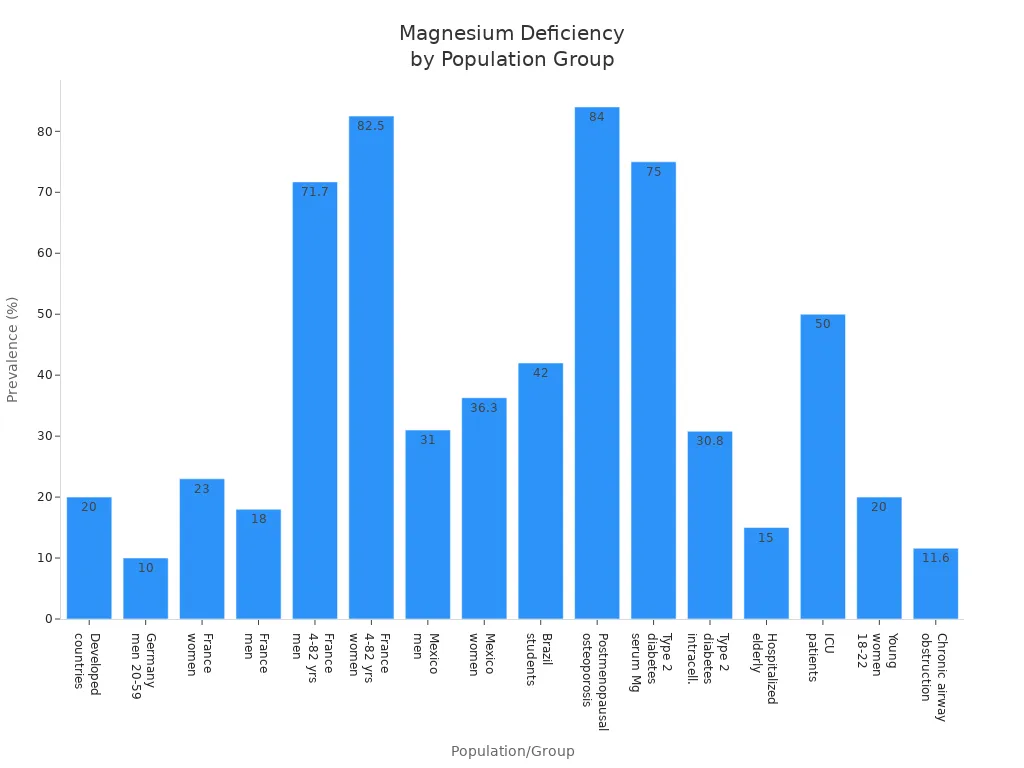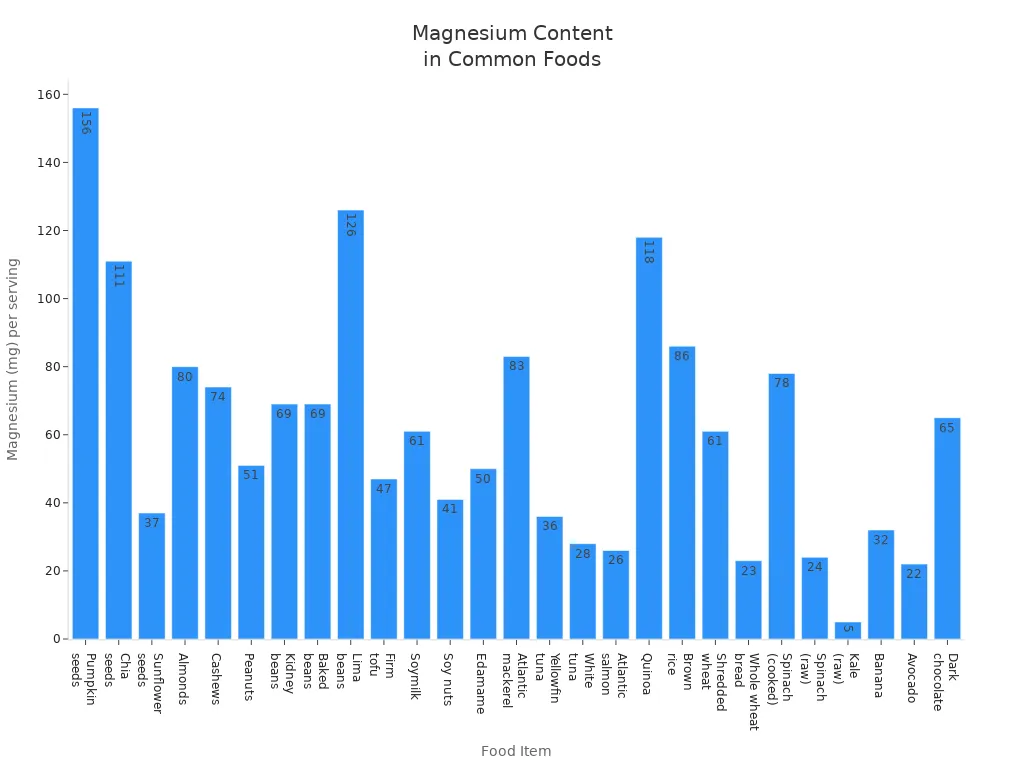The Essential Role of Mg-Zyme Magnesium Explained
Table of Contents

You need mg-zyme magnesium to keep your body working well. This essential mineral helps your muscles move, keeps your heart beating, and supports your nerves. Recent surveys show that more than half of adults do not get enough magnesium from their diet or supplements. Magnesium acts as a cofactor in over 300 enzyme systems. You rely on this essential mineral for energy, strong bones, and normal heart rhythm. Without enough magnesium, your health can suffer, so paying attention to your intake is important.
- Magnesium supports:
- Muscle contraction
- Nerve function
- Blood pressure control
- Energy production
- Bone development
Mg-Zyme Magnesium and Health
Enzyme and Energy Support
You depend on magnesium for energy every day. Mg-Zyme Magnesium helps your body make ATP, which is the main energy source for your cells. Magnesium forms a complex with ATP, making it active and ready for use. This process powers your muscles, nerves, and metabolism. You need magnesium for mitochondrial functions like oxidative phosphorylation and the electron transport chain. These steps help your cells produce energy efficiently.
- Magnesium supports:
- Formation of Mg-ATP complexes for energy production
- Enzyme binding and phosphorylation
- Muscle function and cellular signaling
- Electrolyte balance for metabolism
- All rate-limiting glycolytic enzymes
If you do not get enough magnesium, your cells may struggle to make energy. This can lead to tiredness and muscle weakness. Magnesium also helps neutralize negative charges on ATP, making enzyme reactions faster and more accurate. You need magnesium for the sliding filament mechanism in muscle contraction, which is vital for movement and strength. Mg-Zyme Magnesium keeps your metabolism running smoothly and protects your cells from damage.
Heart and Musculoskeletal Function
Your heart relies on magnesium to beat regularly and stay strong. Mg-Zyme Magnesium protects your heart muscle from damage caused by oxidative stress. Research shows that low magnesium levels can make heart tissue more vulnerable to injury and energy loss. This can lead to irregular heart rhythms and poor heart health. Areas with more magnesium in drinking water have fewer cases of sudden cardiac death. Magnesium helps control blood pressure by relaxing blood vessels and reducing inflammation.
Magnesium deficiency can raise blood pressure and cause changes in your arteries. Your body tries to compensate by increasing magnesium transporters in your blood vessels. This helps maintain magnesium balance but may not fully protect your heart if you do not get enough magnesium. Supplementing with Mg-Zyme Magnesium can lower blood pressure and improve heart function. Magnesium also supports muscle and nerve function, helping you move and stay active.
Tip: You can support your heart health by eating magnesium-rich foods and considering Mg-Zyme Magnesium supplements if your diet falls short.
Nervous System and Relaxation
Magnesium plays a key role in your nervous system. Mg-Zyme Magnesium helps you manage stress and improve sleep. Magnesium acts as an antagonist of the NMDA receptor, which protects your brain from overstimulation and damage. Low magnesium levels can increase calcium flow into nerve cells, causing neurotoxic effects and raising the risk of anxiety and mood disorders.
| Evidence Aspect | Description |
|---|---|
| NMDA Receptor Antagonism | Magnesium blocks excess stimulation, supporting learning, memory, and nerve protection. |
| Stress Response Modulation | Magnesium lowers ACTH release and prevents overactivation of the stress response system, helping with stress management. |
| Neurotransmission and Inflammation | Magnesium boosts neurotransmitters and reduces inflammation, supporting brain health. |
| Gut Microbiota Effects | Magnesium changes gut bacteria, which can affect inflammation and mood. |
| Clinical Intervention Studies | Magnesium supplements can reduce depressive symptoms in adults with low magnesium levels. |
You need magnesium for healthy neurotransmission and to keep your mood balanced. Magnesium helps you relax and sleep better by calming your nervous system. If you feel stressed or have trouble sleeping, Mg-Zyme Magnesium may help you feel more at ease. Magnesium also supports the immune system and helps your body recover from stress.
Health Benefits of Magnesium

Bone and Metabolic Health
You need magnesium to build strong bones and support your metabolism. Magnesium helps your body use vitamin D, which is important for calcium absorption and bone health. When you get enough magnesium, your bones stay dense and less likely to break. Clinical trials show that magnesium supplements increase bone density in postmenopausal women and adolescents. You can prevent fractures and keep your bones healthy by maintaining good magnesium levels.
- Magnesium supports:
- Bone mineral density
- Vitamin D activation
- Calcium absorption
- Bone turnover balance
Magnesium acts as a cofactor for enzymes that activate vitamin D in your liver and kidneys. This process helps your body absorb calcium and magnesium from food. If you do not get enough magnesium, your body cannot use vitamin D properly, and your bones may weaken. You also need magnesium to keep your metabolism working. Magnesium helps your cells make energy and supports protein and DNA synthesis. When you have enough magnesium, you feel less tired and your body repairs itself faster.
Note: You can improve your bone health by eating foods rich in magnesium and making sure your calcium-to-magnesium ratio stays balanced.
Immune and Blood Sugar Support
Magnesium plays a key role in your immune system. You need magnesium for your T cells to fight off germs and cancer cells. Magnesium helps your immune cells move, activate, and respond to threats. If you do not get enough magnesium, your immune system may not work well, and you may get sick more often. Low magnesium levels can also cause inflammation and make chronic diseases worse.
Magnesium helps control blood sugar and supports insulin action. You need magnesium for over 300 enzymes that help your body use glucose and regulate insulin. If you have metabolic syndrome or diabetes, you may lose magnesium through your kidneys. Magnesium supplements can help restore enzyme activity and improve insulin sensitivity. Clinical trials show that magnesium supplements lower fasting blood sugar, insulin levels, and markers of insulin resistance. You can support your immune system and blood sugar control by keeping your magnesium intake steady.
Physical Performance
You rely on magnesium for muscle function and recovery. Magnesium helps your muscles contract and relax. When you exercise, your body uses more magnesium, and low levels can lead to muscle soreness and slower recovery. Studies show that magnesium supplements reduce muscle damage and inflammation after intense exercise. You can recover faster and feel less sore by taking magnesium before physical activity.
| Study Population & Intervention | Outcome Measures | Results | Statistical Significance |
|---|---|---|---|
| Strength training, Mg supplement vs placebo | Quadriceps torque | Mg group gained more strength | p < 0.05 |
| Elderly women, Mg supplement vs placebo | Gait speed, chair stand time | Mg group improved more | p=0.0006, p<0.0001 |
| Aerobic/resistance exercise, Mg supplement | Blood pressure post-exercise | BP reduced after Mg | Significant |
| 1-week Mg supplementation | Exercise performance | Improvement noted | Positive effect |
Magnesium also helps regulate calcium transport in your muscles, which is important for contraction and recovery. If you do not get enough magnesium, you may feel tired and your muscles may not work as well. Acute magnesium supplementation before exercise can improve strength and lower blood pressure. You can support your physical performance and recovery by making sure you get enough magnesium, especially if you are active.
Tip: Active people may need more magnesium than sedentary people. You can take magnesium supplements about two hours before exercise to help your muscles recover.
Magnesium Deficiency
Signs and Symptoms
You may notice several signs of magnesium deficiency if your body does not get enough magnesium. These signs of deficiency can affect your muscles, nerves, heart, and mental health. Common signs of magnesium deficiency include muscle twitches, tremors, cramps, and weakness. You might also feel tired or lose your appetite. Some people experience changes in mood, such as apathy, depression, or anxiety. In severe cases, you could have abnormal heart rhythms or even seizures.
Here is a table that shows the main signs of deficiency and how they appear:
| Symptom Category | Common Clinical Signs and Symptoms of Magnesium Deficiency |
|---|---|
| Neuromuscular | Tremors, muscle spasms, cramps, twitches, weakness |
| Neurological/Mental | Apathy, personality changes, delirium, seizures, coma |
| Cardiovascular | Abnormal heart rhythms, palpitations |
| Other | Loss of appetite, fatigue |
| Electrolyte Overlap | Often associated with hypokalemia and hypocalcemia |
Magnesium deficiency can also cause mental status changes, such as irritability or confusion. If you have low magnesium for a long time, you may develop chronic fatigue or muscle weakness. These symptoms happen because magnesium helps your nerves and muscles work properly.
At-Risk Groups
You may belong to a group that faces a higher risk of magnesium deficiency. Older adults often have lower magnesium levels because their bodies absorb less magnesium and lose more through urine. Women, especially those who are pregnant or postmenopausal, have a greater chance of developing magnesium deficiency. People with chronic diseases, such as type 2 diabetes or digestive disorders like Crohn’s disease, may lose magnesium more quickly.
Poor nutrition and certain lifestyle choices also increase your risk. If you drink alcohol often or take medications like diuretics, you may lose more magnesium. Hospitalized patients and those in intensive care units show high rates of magnesium deficiency. The chart below shows how common magnesium deficiency is in different groups:

You can see that magnesium deficiency affects many people worldwide. If you belong to one of these groups, you may need to pay extra attention to your magnesium intake. Supplementation with products like Mg-Zyme Magnesium can help you maintain healthy levels, especially if your diet does not provide enough magnesium.
Tip: If you notice signs of magnesium deficiency or belong to an at-risk group, talk to your healthcare provider about testing your magnesium levels and possible supplementation.
Dietary Sources and Supplementation

Magnesium-Rich Foods
You can find magnesium in many foods. Choosing magnesium-rich foods helps you meet your daily needs and supports your health. Seeds, nuts, legumes, whole grains, leafy greens, and some fruits and vegetables are excellent sources. Pumpkin seeds, chia seeds, almonds, and spinach stand out for their high magnesium content. Eating a variety of these foods gives you a steady supply of magnesium.
Here is a table showing some top dietary sources of magnesium and their average content per serving:
| Food Category | Food Item | Serving Size | Magnesium Content (mg) |
|---|---|---|---|
| Seeds | Pumpkin seeds | 1 ounce | 156 |
| Seeds | Chia seeds | 1 ounce | 111 |
| Nuts | Almonds | 1 ounce | 80 |
| Legumes | Black beans | 1/2 cup cooked | 60 |
| Whole Grains | Quinoa | 1 cup cooked | 118 |
| Greens | Spinach (cooked) | 1/2 cup cooked | 78 |
| Fruits | Banana | 1 medium | 32 |
| Dark Chocolate | Dark chocolate | 1 ounce (70-85% cacao) | 65 |

You absorb only 30–70% of magnesium from food. The typical diet often lacks enough dietary sources of magnesium, especially if you eat many processed foods. You may need to pay attention to your diet to get enough magnesium every day.
Supplementation Guidance
You may consider supplements if your diet does not provide enough magnesium. Mg-zyme magnesium offers a blend of mineral chelates, which your body absorbs well. These supplements can help you reach healthy levels, especially if you belong to a group at risk for deficiency. Dietary supplements like mg-zyme magnesium include extra enzymes and phytochemicals that may support absorption.
The recommended daily allowance for magnesium depends on your age and gender. Check the table below for guidance:
| Life Stage | Recommended Magnesium Intake (mg/day) |
|---|---|
| Children (4–8 years) | 130 |
| Teens (14–18 years) | Boys: 410 / Girls: 360 |
| Adults (19+) | Men: 400–420 / Women: 310–320 |
| Pregnant Women | 350–360 |
| Breastfeeding Women | 310–320 |
Most people meet their needs through a balanced diet. You should not take more than 350 mg per day from magnesium supplements unless your doctor advises you. Too much magnesium can cause diarrhea, nausea, stomach pain, and muscle weakness. People with kidney problems need to be extra careful with supplements.
Tip: You do not need supplements if you eat enough magnesium-rich foods. Always talk to your healthcare provider before starting dietary supplements.
Some people think everyone needs magnesium supplements, but scientific studies show that a healthy diet usually provides enough. Supplements help only if you have a confirmed deficiency or special needs. Choose the right type of supplement for your body and avoid taking more than the recommended amount.
You support your body by keeping magnesium levels steady. Magnesium helps your bones, heart, and nerves work well. You can eat leafy greens, nuts, and whole grains to get enough magnesium. If you notice muscle cramps or feel tired, you may need a supplement.
Always talk to your doctor before starting magnesium supplements.
- Add magnesium-rich foods to meals and snacks.
- Watch for signs of deficiency and adjust your intake as needed.
FAQ
What is Mg-Zyme Magnesium?
Mg-Zyme Magnesium is a dietary supplement. You get a blend of highly absorbable magnesium chelates. This helps your body maintain healthy magnesium levels. You support your muscles, nerves, and bones with this supplement.
How do you know if you need a magnesium supplement?
You may need a supplement if you feel tired, get muscle cramps, or have trouble sleeping. Blood tests can show low magnesium. Your doctor can help you decide if you need Mg-Zyme Magnesium.
Can you take Mg-Zyme Magnesium with other vitamins?
Yes, you can take Mg-Zyme Magnesium with most vitamins. Magnesium works well with vitamin D and calcium. You should always check with your healthcare provider before starting new supplements.
Are there any side effects from taking Mg-Zyme Magnesium?
Most people tolerate Mg-Zyme Magnesium well. High doses may cause diarrhea or stomach upset. You should not take more than the recommended amount unless your doctor says it is safe.
How long does it take to feel the benefits of magnesium supplements?
You may notice benefits within a few days to a week. Your energy, sleep, and muscle function can improve as your magnesium levels rise. Results may vary for each person.

Poseidon
Master of Nutritional Epidemiology, University of Copenhagen, Herbal Functional Nutrition Researcher
Focus: The scientific application of natural active ingredients such as Tongo Ali, Horny Goat Weed, and Maca to sexual health and metabolic regulation.
Core Focus:
Men: Use a combination of Tongo Ali (an energizing factor) + Maca (an energy reserve) to improve low energy and fluctuating libido.
Women: Use a combination of Horny Goat Weed (a gentle regulator) + Maca (a nutritional synergist) to alleviate low libido and hormonal imbalances.
Stressed/Middle-Aged Adults: This triple-ingredient synergy supports metabolism, physical strength, and intimacy.
Product Concept:
Based on traditional applications and modern research (e.g., Tongo Ali promotes testosterone-enhancing enzyme activity, and icariin provides gentle regulation), we preserve core active ingredients and eschew conceptual packaging—using natural ingredients to address specific needs.
Simply put: I'm a nutritionist who understands "herbal actives." I use scientifically proven ingredients like Tongo Ali, Epimedium, and Maca to help you make "sexual health" and "nutritional support" a daily routine.
